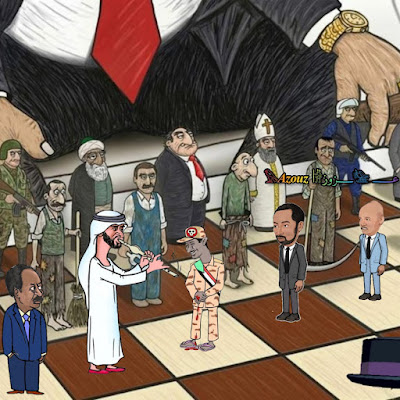Dated Friday, 12 January 2024; 18:00 NEW YORK - here is a copy in full:
‘No diplomatic end to Sudan’s war in sight,’ warns Suliman Baldo
Map of Sudan showing areas under SAF (in red) and RSF (in yellow) control as of December 21, 2023 (Source: @ThomasVLinge via X)
As the war between the Sudan Armed Forces (SAF) and the paramilitary Rapid Support Forces (RSF) soon enters its ninth month, there remains no tangible end in sight to the widespread suffering endured by the country and its people. That is despite a flurry of diplomatic mediation efforts, says prominent Sudanese researcher Suliman Baldo.
In his analysis ‘Sudan’s Interminable War, published by the International Centre for Dialogue Initiatives on Tuesday, conflict resolution expert Suliman Baldo* observes that while both the SAF and the RSF “initially believed they would crush the other in days”, the conflict has dragged on into “multiple localised ethnically driven clashes beyond either party’s control”.
On the ground, the RSF has succeeded in expanding its territorial control in Darfur, Kordofan, and Khartoum, while SAF remains in control of northern, central, and eastern regions, including de-facto administrative capital Port Sudan. In December, an RSF offensive “wrestled the central Gezira state from the army’s control and threatened its presence in the White Nile and Sennar states”.
The war unmasked SAF’s ineptitude, Baldo asserts, “as its senior commanders became too steeped in grand corruption practices to pay attention to the decay of SAF as a fighting force”.
Their adversary, the RSF, is “ethnically aligned, with plunder as the main motivation of its fighters”. The paramilitary force “proved incapable of providing for the population” in El Gezira after it took over the former safe haven for those who fled Khartoum and El Obeid in the early days of the war.
At the end of December, the Wad Madani Resistance Committees lamented the deterioration of security, health and humanitarian conditions in El Gezira, continued attacks by the RSF, the lack of functional hospitals, and the ongoing waves of displacement in the state.
The region is divided over Sudan. Sudanese policy analyst Kholood Khair and civil society activist Asmahan Akam wrote in Time magazine in December that “Egypt, Iran, Turkey, and Saudi Arabia support the SAF while the United Arab Emirates (UAE), a UN Security Council member, backs the RSF in seeming violation of the body’s own arms embargo on Darfur, first enacted in 2004 and just renewed (with a yes vote from the UAE) in March 2023”.
‘No tangible solution’
The SAF, with junta leader Lt Gen Abdelfattah El Burhan at its head, conditions a ceasefire on the RSF evacuating private and residential areas. Baldo explains that this is most likely to be rejected by the latter, as it maintains a tactical advantage in doing so, especially in Khartoum where it continues to lay siege to several SAF command stations.
Whilst ongoing conflict threatens SAF’s collapse, Baldo believes, “a traffic jam of diplomatic initiatives” has yet to bring forth any sustainable nor tangible end to the conflict.
The Jeddah talks, facilitated by the US and Saudi Arabia, stalled due to belligerents’ failures to honour commitments. The United Nations (UN) “was relegated to an observer’s seat as Sudan unilaterally terminated its political mission”, whereas “offers of mediation by Russia, Turkey, and a Sudan neighbours’ initiative launched by Egypt in July failed to generate traction because the RSF declined to cooperate with any”.
By the end of 2023, the Horn of Africa Intergovernmental Authority on Development (IGAD), whose members include Djibouti, Kenya, the Sudans, Uganda, Ethiopia, Somalia and Eritrea, emerged as a lead mediator for a humanitarian ceasefire and civilian-led political negotiations.
IGAD convened in Djibouti in early December, for an extraordinary assembly session on the situation in Sudan, where members agreed to redouble efforts to achieve a peaceful resolution, including mediating head-to-head talks between El Burhan and RSF commander ‘Hemedti’.
“However, several challenges emerged in the final days of 2023 and early 2024 that risk derailing the IGAD’s role in these processes.”
Hours after the IGAD communiqué of the summit was released, the Sudanese Ministry of Foreign Affairs initially denied El Burhan’s agreement to meet with Hemedti without conditions, stating that the communiqué’s content “was not based on consensus nor legally binding.”
Baldo notes that the FA Ministry is “dominated by Islamist allies of the SAF” who are most likely behind the initial rejection of the offer. El Burhan later agreed to meet with Hemedti.
Another challenge facing IGAD’s role is the official reception and hospitality received by Hemedti during his Africa tour, in which he was hosted by the heads of four IGAD member states, including chairperson Ismail Guelleh, the President of Djibouti.
“Hemedti’s reception as a visiting dignitary bestowed on him a diplomatic legitimacy that provoked the ire of the SAF, and made less likely that Burhan would agree to meet with him under the IGAD’s auspices after this slight”, the expert explained.
Last June, Sudan’s Sovereignty Council, chaired by El Burhan, declared that “Kenya is not neutral and is home to RSF rebel leaders”.
Last week, acting FA Minister Ali El Sadig announced that Sudan summoned the Kenyan ambassador to protest against the official reception of Hemedti by the Kenyan president.
* Dr Suliman Baldo is an expert in justice, human rights and conflict resolution in Africa and served as the Africa head of International Crisis group, the International Center for Transitional Justice, and has also held human rights and mediation posts in the United Nations. He has provided expert advice on human rights in Mali and Darfur and currently leads the Sudan Transparency and Policy Tracker. (Source: International Centre for Dialogue Initiatives website)
Continue Reading
Previous
Sudanese in El Gedaref are arming themselves ‘despite hate of Islamists’
View original: https://www.dabangasudan.org/en/all-news/article/no-diplomatic-end-to-sudans-war-in-sight-warns-suliman-baldo
ENDS












